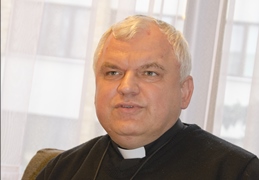|
In Ukraine, Greek Catholic Church's 'needs are great and varied' "This war actually created unbelievable wounds within marriages and families." Bishop Jacek Pyl heads the Greek Catholic Diocese of Odessa-Simferopol in Ukraine. He spoke with international Catholic agency Aid to the Church in Need Sept. 4, on a visit to Montreal, Canada. Can you describe the diocese of Odessa-Simferopol in terms of the numbers of faithful, its churches and other information you would like to share with us about your diocese? The Diocese of Odessa-Simferopol is situated in the Southeast territory of Ukraine. It’s a bit bigger than one third of Poland. It is a missionary territory which is slowly growing and within it, we face many challenges. The diocese is presently split following the Russian take-over of Crimea. My co-cathedral is situated in Simferopol in Crimea, where the Russian presence has taken-over while the diocesan bishop is in Odessa – which is approximately 300 miles from Simferopol. Therefore, my diocesan bishop, Bishop Bronislaw Bernacki, is in Odessa and I am in Simferopol. Under my jurisdiction there are seven parishes and 13 priests. The entire diocese has 64 priests and there are some 3,000 faithful. Can you tell us about the climate in the diocese since the split took place? It is a very challenging situation where we have many questions but not too many answers. Although there is war in Ukraine and Crimea is under Russian rule, the Catholic Church can still exercise its ministry but we do not know how our future is going to look.
Can you tell us what you know about the priest who was kidnapped in eastern Ukraine? I am aware of one priest who was kidnapped and released a week later thanks to the efforts of bishops and also thanks to the priests of Patriarchate of Moscow. He is doing his ministry; however the local bishop restricted his ministry because of the ongoing fighting. Can you tell us more about the actual needs at this time? The needs are very great and varied because this territory is where our most basic and fundamental work began just 25 years ago. If we speak about needs, first of all we need priests and also religious sisters who would help us with evangelization. In Crimea, we celebrate Mass in three languages: predominantly in Russian, but also in English and Spanish. And occasionally we celebrate Mass in Ukrainian and Polish. If I would have enough priests I would be able to open several new parishes. I would like to invite a contemplative order of Sisters who would pray and support this mission from a spiritual point of view because it is an incredible challenge we face, and we need the spiritual support. Once I find a religious order who would like to come and work with us, I would also like to build a monastery for them for which I will need funds. In Ukraine (Kiev and Kharkov) there are Carmelite Sisters and we are very happy to have contemplative religious orders. A contemplative dimension is very important in our work of evangelization. What would you like to see happen in your diocese? If the situation stabilizes than my plan is to build a co-cathedral there because we have a very small place for celebrating Mass and for meetings with people at this time. We have been waiting for the last 20 years to get permission to build a church. So, time will show, and we would also like to build facilities for priests and for meetings with parishioners. Will this project be submitted to ACN? Yes. Primarily, ACN looks after these types of projects. As I mentioned, we have been trying for the last 20 years to get permission to build a church. More recently, I had begun speaking with the Orthodox Metropolitan Lazar, representative of the Moscow Patriarch in Simferopol; he showed certain openness towards the idea of building a church. We have done many things in order to advance our preparation for building the co-cathedral and other facilities but, everything stopped after the Russian take-over and we are not sure if we will have to start again from the beginning or what will happen with the project. How did the people of your diocese react after the tragic crash of a Boeing Malaysia Airlines plane which caused the deaths of 298 people on July 17? It was a great shock for everyone. We prayed for those people and embraced them with our prayers. We prayed for those who shot down the plane and for those who were killed. It was a terrifying situation when we learned that these people, their bodies, were deprived of their dignity because thieves stole their clothing, their belongings, credit cards and whatever they could find. They were not treated like human bodies … We recently learned that there will be elections next month. What is the position of the Church? Are you encouraging people to vote? The Catholic Church of the Latin rite prays for just elections and also that wise people are elected for this country. Ukraine has suffered so much and for so long – so it is about time that we have good and wise people who will rule this country. We also need champions for peace - because whenever war takes place, everyone suffers. Families and children – Ukrainian and Russian people suffer alike. War tears people and families apart. Can you tell us more about the impact on families as a result of this conflict? There are many mixed marriages, between Ukrainian and Russian people. This war actually created unbelievable wounds within marriages and families – the society and the Churches. So, we pray for healing and reconciliation, because it brought upon this nation incredible devastation. We pray for a solution which would create a new civilization that does not turn to force to resolve problems, but finds ways through dialogue and mutual respect to build a new society.
|
|
|

